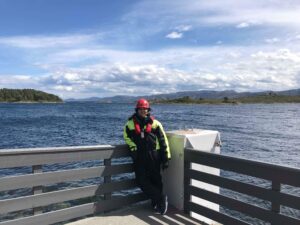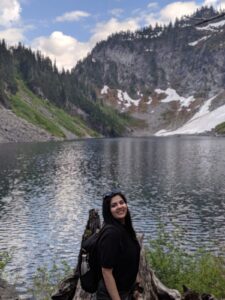Thinking Seqentially
Mayuree Binjolkar is this year's Three Minute Thesis Winner for her work on investigating sequential decision-making as part of overall car driving behavior
From a young age, Mayuree Binjolkar was fascinated by the world of engineering, catching the spark of exploration and innovation from her parents, who were both engineers in India.
Mayuree began her journey studying Civil Engineering in Israel at the Technion – Israel Institute of Technology. After her undergraduate degree, Mayuree came to the U.S. as a research scholar, where she explored air quality monitoring using transportation data. Although she was supposed to start at the University of Washington as an environmental engineering graduate student in the Department of Civil and Environmental Engineering, her interests led her once again to change to the transportation engineering graduate program. “I sort of stumbled into transportation data but ended up liking the many domains within the area of Transportation Engineering,” Mayuree says.

Her interest in understanding large transportation data sets began while working with the ORCA, the smart card system used in public transportation in the Puget Sound area. She used GPS location data from nine different transit agencies to understand ridership patterns within Seattle. Based on her work with ORCA, she was selected for the Data Science for Social Good Fellowship in 2017, where she worked to uncover hidden patterns of ridership using machine learning.
Mayuree used her research from her Ph.D. at the UW and presented it at this year’s Three Minute Thesis Competition. One of her funded research projects that examined how drivers behave at different types of traffic crosswalks sponsored by the Toyota Collaborative Safety Research Center led Mayuree to investigate sequential decision-making as part of overall driving behavior.
“Sequential decision-making is a smaller part of the overall behavior,” Mayuree says. “How you make a sequence of decisions would determine the overall driving behavior.” Her dissertation focuses on two goals: improving traffic safety and vehicle automation.
Based on Mayuree’s research, sequential behavior can unearth drivers’ dangerous decisions, providing researchers with a launchpad to develop systems that can provide safer alternatives (e.g., a collision warning system).
For Mayuree, once we understand the patterns of these human driving decisions, we can design better autonomous vehicles by programming particular scenarios and outcomes into their computers, leading to safer interactions with human-driven cars.

“Focusing on identifying dangerous driving behavior and developing systems that can recommend safer alternatives can improve driver safety and, consequently, traffic safety,” Mayuree says.
For many researchers, science communication is not a prioritized skill—Mayuree was eager to develop this skill through the Three-Minute Thesis. “Practicing for the competition helped me learn to explain my research in a way that was accessible to a wider audience,” Mayuree says. The experience also made her think critically about scientific communication and how to disseminate research results for a broader audience. She believes the skills learned from the competition will be helpful in her upcoming Ph.D. defense and future career.
For Mayuree, her journey and her impact has just started. Her ultimate goal is to create her own start-up. “That’s what I saw in Israel and that’s always been a dream for me,” Mayuree says, “If I’m able to do something with my knowledge and create value out of it in the industry and bridge that gap between academia and industry, that would make me happy.”
By, Tatiana Rodriguez, UW Graduate School
Published on: May 23, 2023